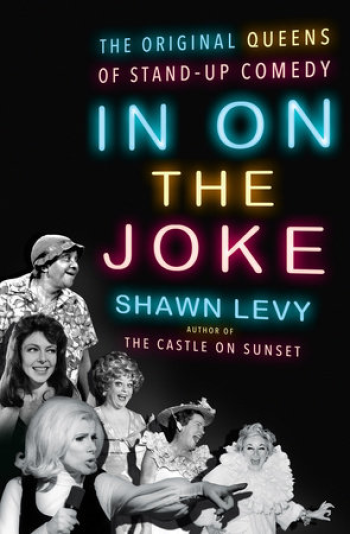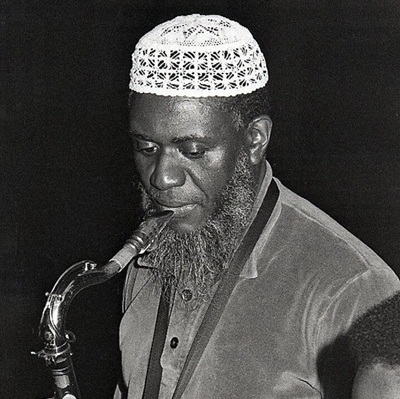.
.

.
.
Shawn Levy, the bestselling author who has successfully written on subjects like Paul Newman and the “Rat Pack,” has just published In On the Joke: The Original Queens of Stand-Up Comedy, an entertaining, terrific account of the trailblazing women of stand-up comedy who broke down walls so they could stand before the mic.
In anticipation of an upcoming Jerry Jazz Musician interview with the author, this excerpt from the book – focusing on the great comedienne Moms Mabley – provides an example of the work’s excellence…
.
.
___
.
.
“Dying is easy, but comedy is hard; for women, until about ten minutes ago, it was almost impossible. But only almost. In his ground-breaking history of women in stand-up, Shawn Levy brilliantly weaves together history, politics, and culture to tell the epic saga of those bold and fearless trailblazers who dared to tell jokes while being female. Well-researched, profound, and laugh out loud funny, In on the Joke is simply fabulous. I loved it!”
Karen Karbo, author of In Praise of Difficult Women and How to Hepburn
.
.
photo by Shannon Brazil

Shawn Levy is the former film critic of The Oregonian and KGW-TV. His writing has appeared in Sight and Sound, Film Comment, American Film, The New York Times, the Los Angeles Times, The Guardian, The Hollywood Reporter, and The Black Rock Beacon. He is the bestselling author of Rat Pack Confidential, Paul Newman: A Life, and Dolce Vita Confidential. He jumps and claps, and sings for victory in Portland, Oregon.
www.shawnlevy.com
.
.
Excerpted from In On the Joke: The Original Queens of Standup Comedy by Shawn Levy. Used with permission of Penguin Random House.
.
.
___
.
.
CBS Television, Public domain, via Wikimedia Commons
Moms Mabley in 1968
.
.
…..But it wasn’t the last time she would appear on the actual Broadway. In late 1941, the Ubangi Club moved from 125th Street in Harlem to a spot between West Fifty-Second and Fifty-Third Streets on Broadway, with a policy of bringing the best uptown performers to downtown audiences. Among the first was Jackie Mabley. Or, rather, Jackie “Moms” Mabley, as she was billed for the first time in her career.
…..At age forty-three (and, to be fair, perhaps already a grandmother, with all of her daughters married by that summer), Jackie had fully developed the stage persona by which the world would come to know her: Moms, a sharp-eyed, cantankerous, plain-speaking older woman who suffered no fools, wore housedresses and floppy hats (often over a wig, which was, often, red) and slippers, wasn’t afraid of salty language, and had an eye for irony and hypocrisy and a sweet tooth for gin and for the company of young men. As a fireside philosopher, Moms commented on men, children, sex, politics, contemporary fashions in music, clothes, courtship—the whole gamut of human experience. The character was a mask: the wardrobe like a clown’s suit, the slow, raspy-voiced delivery, the countrified speech, and, in later years, the decision to perform while seated in a chair and without her false teeth. You felt as if you were sitting in her kitchen, listening to her pontificate while she cooked. The character also freed her from the obligation to tell joke-jokes. Oh, she had them, lots of them. But Moms’s discourse was more free-form than rat-a-tat. In some of the earliest surviving footage of her stage act, she warns her audience, “Moms don’t know no jokes But I can tell you some facts.”
…..A lot of the humor of her act was based on contrasts: the wizened old gal with the lively libido and fondness for the bottle. She would shuffle onto the stage, slowly, a bit disheveled, maybe talking to herself, or hushing the band or the crowd, and she would wander up to the mic (in later years, she took to sitting in an easy chair), and she would begin her discourse with a humble “I got somethin’ to tell ya ”—a wise, weary impatient granny to all the world, even while still in her forties.
…..She would, invariably, talk about men, complaining about the difference between suitors of her own age and the fellows she really hankered for. As she said a million times, “The only thing an old man can do for me is bring me a message from a young man.” She compared having sex with an old man to “pushing a car uphill with a rope,” she complained that an old man she was once forced to marry was hit with a grain of rice at the wedding and passed out, and she declared, repeatedly, “A woman is always a woman, but a man’s only a man as long as he can.”
…..In a typical bit, she bemoaned a romantic offer she’d recently received: “Old washboard-face mildewed man had the nerve to come around backstage and ask me can he see me home? I said, ‘Damn, you can’t see period.’ ” It was a chore, she confessed, her appetite: “I’m old, and I need youth, and it’s very expensive.” But when it was satisfied: Wow. Teasing one of her bandleaders, she said, “Let me tell you girls somethin’. George took me home the other night and kissed meeeeeeeee. My big toe shot up in the air just like that!”
…..The Moms character was truly one of the most inspired comic inventions of its time, becoming as familiar, at least to Black audiences, as Jack Benny’s cheapskate persona or, later, Rodney Dangerfield’s disrespected schlub were to whites. But it wasn’t entirely an act. Indeed, despite her reputation for sometimes surprising offstage behavior, a native motherliness in her real-life character was evident to her show-biz colleagues and was the source of the nickname Moms. As she said later, “The show people gave me that name, of both races. I don’t know why, but even when I was young they would bring their problems to me to settle. They would get away from home and not be able to get back, so I would help send ’em home. Or I would put on a pot of something for those that didn’t have much money, and I would see that they were fed. So they named me ‘Moms.’ ”
…..She took that same foster attitude with her onstage, greeting her audiences by calling them her “children,” as if embodying her own beloved granny, dispensing wisdom as she cooked over an open hearth. She had a decades-long gag about being asked by world leaders for their advice—a way of mixing political jokes in with her homespun schtick. She would refer to presidents and their wives by their first names, as if they were kin, and talk about how she’d teach ’em some sense. (When the Eisenhowers were in the White House, she would say something like “Last week Mamie called me up, you know? I said, ‘Listen, Mames.’ She said, ‘Yes Miss Mabley . . .’ ”) It was charming and genuinely groundbreaking: She discussed race relations, economics, and politics at a time when virtually every other comedian (almost every single one of whom was a man) stuck to jokes about their mothers-in-law or taxes or whatnot. As she once put it, “I just tell folks the truth. If they don’t want the truth, then don’t come to Moms. Anybody that comes to me, I’ll hip ’em. I don’t say anything I don’t mean.” Between the death of Will Rogers in 1935 and the rise of Mort Sahl in the mid-1950s, Moms Mabley was just about the only comedian in America offering pointed opinions on current affairs. That she was Black and a woman made her originality and daring trebly remarkable.
…..In some regards, Jackie had been crafting the Moms character for twenty years, ever since she first drifted out of boy-girl acts and into her own specialty as a solo monologist. She was noted early on for her clownish stage clothes and her chatter, which was more like cracked folk wisdom than setup/punch line joke telling; eventually, weary of trying to maintain stage partnerships, realizing that singing and dancing weren’t truly her calling, she simply dropped everything except the straight-talking old gal persona. As she later explained, there was a concept behind the act, even in her very earliest days as a professional entertainer when she was, in her words, “letting granny grow I had in mind a woman about 60 or 65, even when I first came up. . . . She’s a good woman, with an eye for shady dealings. . . .She was like my granny, the most beautiful woman I ever knew. She was the one who convinced me to go make something of myself. . . .
She was so gentle, but she kept her children in line, believe that.”
…..None of which is to say that Moms wasn’t hip. In fact, at around the same time that she was fully embracing the persona in which she would become famous, part of the act was making fun of herself by using hepcat lingo while presenting herself as a frumpy old granny. The New York Amsterdam News described her as playing “the old-school type of comedy in which she is the ragged urchin dazzled by modern life’s progress,” adding that she was able to get the best of her fellow comics “under the sheer weight of shrewd ‘jive’ talk.” She had a catchphrase, based on a novelty song that she performed: “Ketch On” (“Do you ketch on?” she would ask audiences.) She had an ongoing joke about famed jazzbo Cab Calloway being her boyfriend. And she would win big laughs with such cool patter as “Put this jive in your back pocket, man, until I get back. I’m going downtown to see the man, and I have no time to shake your hand.”
.
.
___
.
.
Excerpted from In On the Joke: The Original Queens of Standup Comedy by Shawn Levy. Used with permission of Penguin Random House.
.
.
Moms Mabley, in a 1969 televised appearance
.
.
.
.















































